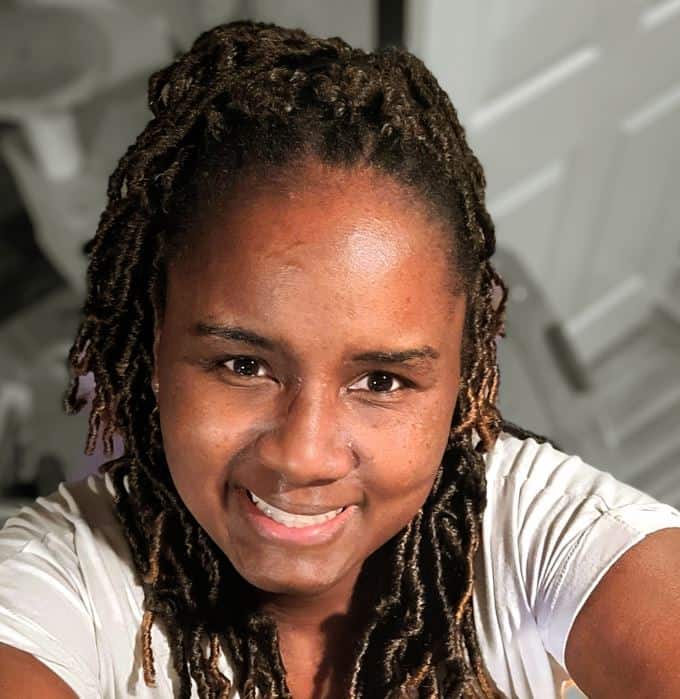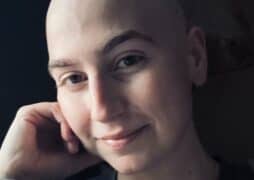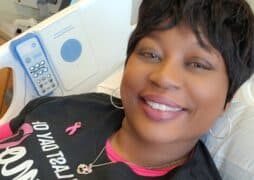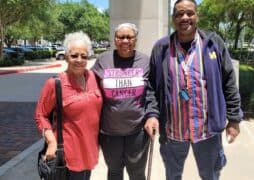
Monique Eddins was diagnosed in November 2019 with stage 2 invasive ductal carcinoma. An active-duty service member and mother of four, her journey began when she noticed a lump in her left breast. Monique tested positive for a BRCA gene mutation, and is concerned about her children’s risk of developing breast and other cancers in the future. This is her story in her own words.
There is not a history of breast cancer in my family, so I was shocked when I was diagnosed. I never imagined I would have breast cancer.
I noticed the lump while taking a shower in the gym after working out and immediately called to make an appointment with my OBGYN. They were able to get me in that day and when I got there, the nurse practitioner did an exam and insisted that what I felt was a benign cyst. I told her that this wasn’t normal for me and asked for a further evaluation. However, since I had already had a mammogram earlier that year, they were reluctant to give me another. They wanted to just watch the area to see if there were any changes and reevaluate in six months.
Again, I insisted that this was not normal for me. Finally, the nurse put in a referral to radiology, but it wasn’t put in as immediate but instead as routine. That meant I had to call and make an appointment instead of being seen that day. It was several weeks before I could get in.
At the appointment, the radiologist, after doing a breast ultrasound of my breast, insisted that the lump was benign. She, too, wanted to wait six months to reevaluate. I pushed the issue further and she finally agreed to do a needle biopsy of the lump the next day. The radiologist tried to get the sample three times and was unsuccessful. She said my breast was too dense and I was referred to general surgery to get the biopsy. I had to wait another couple of weeks before I could have the biopsy, which happened on November 6.
On November 14, I was at work and in class with my cadets, as I was an assistant professor of military sciences at the time. I normally would not have answered the phone in class, but I saw that the area code was the same as my medical treatment center.
I won’t forget that day. I answered the phone at 9:14 a.m. and a nurse, with whom I had never spoken before, was on the other end. After verifying who I was, she told me she had news about my results: “I am sorry to tell you that it is breast cancer.”
I had to maintain my composure because I was in class, so I told her I would call when I was back in my office. When I called her back, she told me the stage, grade and that I was triple negative. I had to come back in the following day to discuss a plan forward.
After my diagnosis and several more tests, I got a port put in and began chemotherapy. I also got genetic testing done that said I was a BRCA 1 gene mutation carrier. After chemo, I had a double mastectomy and a few months later got reconstruction done.
I have had a few minor procedures and endless appointments. Because of the BRCA gene mutation, I am at risk of ovarian and pancreatic cancers as well. In May 2022, I had a bilateral salpingectomy to help prevent ovarian cancer, but I am still not out of the woods and am monitored every six months.
I have three boys ages 17, 15 and 14 and one daughter who is 9. Since I am BRCA 1 positive, I worry about all of them. They could be carriers of the gene mutation, too, and potentially get breast cancer. When my daughter turns 18, I am fully prepared to have her undergo genetic testing.
I hope my story will encourage someone to trust yourself and your body and advocate for your health. Your family needs you and you are not alone.
Click here to learn more about breast cancer risk.
Statements and opinions expressed are that of the individual and do not express the views or opinions of Susan G. Komen. This information is being provided for educational purposes only and is not to be construed as medical advice. Persons with breast cancer should consult their healthcare provider with specific questions or concerns about their treatment.



